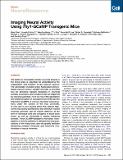Imaging Neural Activity Using Thy1-GCaMP Transgenic Mice
Author(s)
Chen, Qian; Cichon, Joseph; Wang, Wenting; Qiu, Li; Lee, Seok-Jin R.; Campbell, Nolan R.; DeStefino, Nicholas; Fu, Zhanyan; Yasuda, Ryohei; Looger, Loren L.; Arenkiel, Benjamin R.; Gan, Wen-Biao; Feng, Guoping; ... Show more Show less
DownloadChen-2012-Imaging Neural Activ.pdf (2.075Mb)
PUBLISHER_POLICY
Publisher Policy
Article is made available in accordance with the publisher's policy and may be subject to US copyright law. Please refer to the publisher's site for terms of use.
Terms of use
Metadata
Show full item recordAbstract
The ability to chronically monitor neuronal activity in the living brain is essential for understanding the organization and function of the nervous system. The genetically encoded green fluorescent protein-based calcium sensor GCaMP provides a powerful tool for detecting calcium transients in neuronal somata, processes, and synapses that are triggered by neuronal activities. Here we report the generation and characterization of transgenic mice that express improved GCaMPs in various neuronal subpopulations under the control of the Thy1 promoter. In vitro and in vivo studies show that calcium transients induced by spontaneous and stimulus-evoked neuronal activities can be readily detected at the level of individual cells and synapses in acute brain slices, as well as chronically in awake, behaving animals. These GCaMP transgenic mice allow investigation of activity patterns in defined neuronal populations in the living brain and will greatly facilitate dissecting complex structural and functional relationships of neural networks.
Date issued
2012-10Department
Massachusetts Institute of Technology. Department of Brain and Cognitive Sciences; McGovern Institute for Brain Research at MIT; Picower Institute for Learning and MemoryJournal
Neuron
Publisher
Elsevier
Citation
Chen, Qian, Joseph Cichon, Wenting Wang, Li Qiu, Seok-Jin R. Lee, Nolan R. Campbell, Nicholas DeStefino, et al. “Imaging Neural Activity Using Thy1-GCaMP Transgenic Mice.” Neuron 76, no. 2 (October 2012): 297–308. © 2012 Elsevier Inc.
Version: Final published version
ISSN
08966273
1097-4199